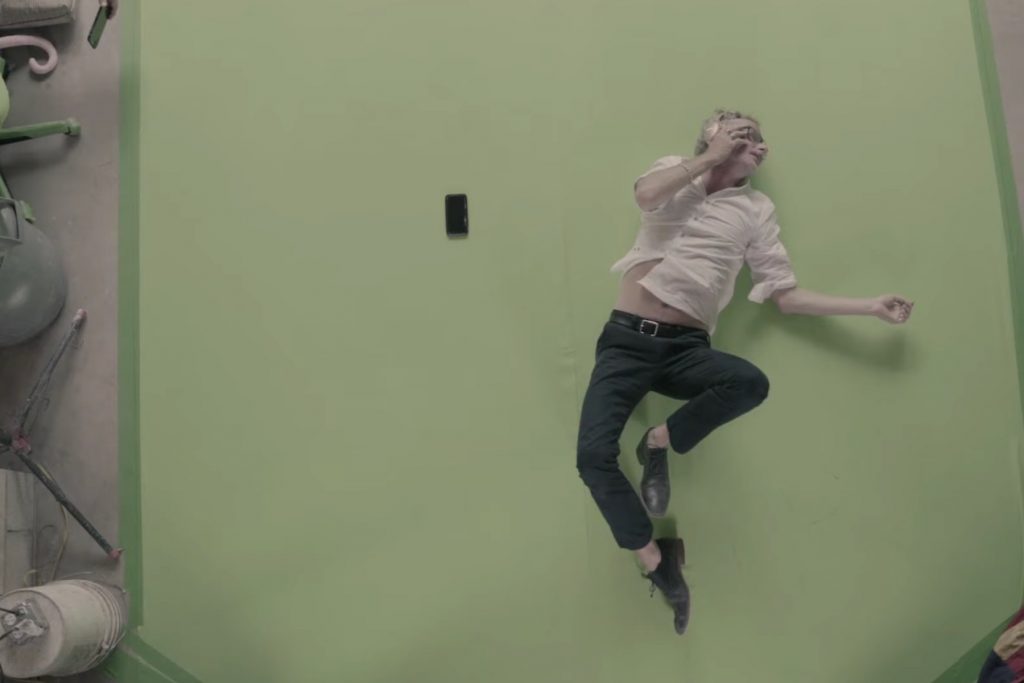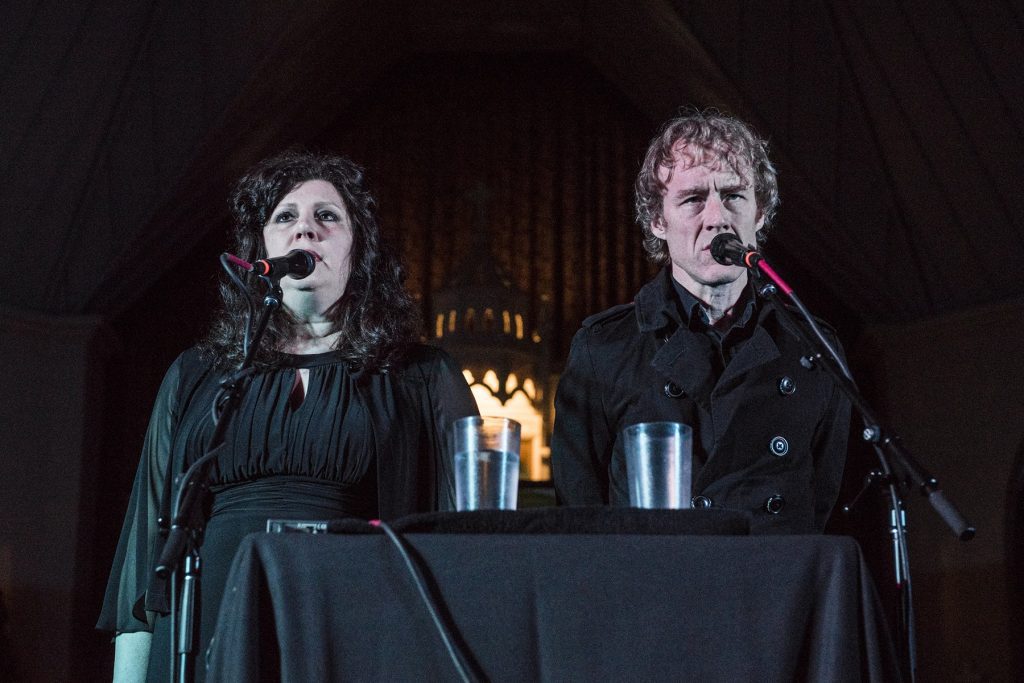
Loudon Wainwright III Is Still the Poet Laureate of Family Dysfunction
Each day on Loudon Wainwright III’s front yard, squirrels attack Donald Trump. Well, not exactly: Dangling by string from a tree on his front yard on the eastern tip of Long Island is a Trump squirrel feeder, a plastic head in the shape of a certain world leader that Wainwright stuffs with peanut butter to keep critters away from his house. “It works pretty well,” he says, “but I’m not sure what state the peanut butter is in now.”
Wainwright’s perverse taste in animal bait is a good indicator of his wry and singular outlook. This year marks the 50th anniversary of the singer-songwriter’s first album, and since then, he’s become one of his generation’s foremost chroniclers of mortal-coil existence. If you want a song for a playlist of your life, from school days and youthful carousing to marriage, parenthood, divorce, and old-age meds, there’s bound to be one in Wainwright’s catalog to match: some somber, some funny, some painfully applicable to anyone’s reality.
Then again, you may know him as a screen presence. As an actor, Wainwright has appeared in episodes of TV shows from M*A*S*H to Parks and Recreation and the cult series Undeclared, and has had bit parts in movies like The Aviator and Cameron Crowe’s Elizabethtown. His friend Christopher Guest directed the film version of Surviving Twin, Wainwright’s stage show based around his songs and the life and work of his father, the late Life journalist Loudon Wainwright II. Another fan, Judd Apatow, served as executive producer of the film, which premiered in 2018 on Netflix.
Of course, Wainwright remains the patriarch of one of pop’s greatest musical families, which includes his children Rufus and Martha and his ex-wives Suzzy (of the Roches) and the late Kate McGarrigle (of Kate and Anna McGarrigle). Over the decades, they’ve all roasted each other in song, venting their issues and frustrations with one another in some of the sharpest and most elegant analyses and takedowns in pop.
Like many musicians his age and younger, Wainwright is currently marooned at home. A planned U.K. tour with Suzzy Roche and their daughter, Lucy, has been scotched, and with his white beard grown out, Wainwright appears to be very much in chill mode. “Yeah, it feels like I’m retired,” he says. “I’ve fantasized about retiring, and it looks like it’s just dropped in my lap. For some reason, I’m not freaking out about not making a living.”
Wainwright’s family history also infuses his upcoming album, I’d Rather Lead a Band, coming this fall. Last summer, when it was still possible to make music in a recording studio, he got together with producers Randall Poster and Stewart Lerman and the vintage-swing band Vince Giordano and the Nighthawks. All had worked together on vintage songs for Boardwalk Empire, but it was Poster’s idea for Wainwright to make an entire record of pre-rock pop songs. Sounding at times like a lost Gatsby soundtrack (and we don’t mean the recent DiCaprio version), I’d Rather Lead a Band features songs by Irving Berlin and Lorenz Hat, others popularized by Bing Crosby and Louis Prima, standards like “Ain’t Misbehavin’,” and risqué ditties like “Give It to Mary with Love” that are of a piece with Wainwright’s own naughty-guy side.
Settled into a socially distanced chair on his front lawn, Wainwright is asked about his Rod Stewart–style standards move late in life. “Finally!” he says with a mock-happy smile. “Even Dylan made a couple of these records. Someone told me he made five. There was a triple album in there. I missed that somewhere along the line.”
In an interview with us posted last week, Rufus recalled a IndieLand photo shoot with you at this very site, which resulted in the two of you not speaking for a while.
We did it right over there on that lawn. I remember not liking the way I looked in the picture [laughs]. I thought I looked grumpy or old or both. I remember being in a rage about that! But things are better now.
Coincidentally, he’s released a new album just as you’re announcing yours.
I was just reading some of the reviews, which seem to be pretty good! I’ve heard it. It’s good. It’s more pop, but he’s singing his ass off.
How would you describe your relationship now?
We’re in pretty good shape. He has a child, and I like to think that now that he knows how fucking hard it is to be a parent, he’s forgiven me! You know, I was largely an absentee dad, certainly in the case of Rufus and his sister Martha, and also to a degree my daughter Lucy, and even my other daughter Alexandra. I was on the road or self-absorbed. That’s all been chronicled in everybody’s songs. And in my book. It’s just what happened in my life, but I seem to be getting along pretty well with the kids.
In another interview, Rufus said he still needed “a lot of information” from you, including about “being in music.”
The music business? Fuhgeddaboudit! I don’t even think of myself as being in the music business. I don’t know how any of that works.
Speaking of family, your lineage seems to inform this new album and these songs from almost a century ago.
My sensibilities have been tuned to that kind of music, because my dad had all those records — jazz, Broadway musicals, the Sinatra records, Louis Prima. I have memories of being a little kid in my pajamas, watching my parents get ready to go out to dinner, and they would have had a couple of drinks already and they’d dance close to each other to Sinatra or Benny Goodman records. If you’re six or seven and you’re watching your parents all dressed up, it’s sexy. It was beautiful and powerful. It was the music they loved and their parents loved. So I think that’s one of the reasons I’m attracted to it.
In the liner notes, you refer to the appeal of this music as “cascading reminiscence bump.” Being fascinated by the music your parents…
Shtupped to! Whoever came up with that, I believe that.
What was the process of selecting the songs?
There were a lot of well-known songs that came up, and some of them I rejected because there were definitive versions. We were thinking about “I Can’t Get Started.” There’s a Bunny Berrigan version of that, with that trumpet solo. What are you going to do with that? Unless you deconstructed it somehow, we weren’t going to top it. There were a couple of Louis Armstrong things. His versions were just so strong and so identifiable with him.
But I’ve always loved shedding my singer-songwriter persona and just being a vocalist. I heard a Bunny Berrigan version of “I’d Rather Lead a Band.” I love the song, and I thought I could sing it better than him. So there was a bit of “I could do that.” I saw Remember the Night, the movie with Barbara Stanwyck and Fred McMurray; “A Perfect Day” is in there, and I thought, “What a strange song.” That’s a song I missed along the way.
A lot of those songs are sad. “A Ship Without a Sail” — that’s kind of a downer! [Laughs] But it’s beautiful. It’s poetry, I’d say. There’s a verse in that song that I wish I’d written: “I go to this or that place/I seem alive and well/My head is just a hat place/My breast an empty shell/And I’ve a faded dream to sell.”
You rewrote a verse in Irving Berlin’s “I’d Rather Lead a Band.”
The songwriter in me couldn’t resist. I said, “I can make this better.” He’s dead. He couldn’t stop me!
You also do a Louis Prima song, “You Rascal You.” It could also be an anti-Trump protest song now.
[Rubs hands together] Let’s do it!
Why should people be drawn to this music now?
Why do I put on a Thelonious Monk record when I’m making dinner? If it’s good, it’s good. I don’t want to make any comparison, but the songs are just great. I think people should hear it. Now, the reality is, ‘Will they hear? Will it get played on the radio?’ I don’t know. But it was fun to do.
I admire this kind of writing. [The songwriters] weren’t performers, and they didn’t really interject their personalities into the songs, the way that my songs, I’m kind of all over them — this misanthropic, goofy, however you want to characterize what it is that I present. Other people were singing these songs. So they had to be, in a sense, generic. But in the good sense. They were personal, but they had to do with everybody.
Does putting together a record like this make you wish you’d written more songs that anyone could cover?
I have some songs that anybody could sing. But I’m always interjecting myself and my family into my songs. It seems to be a … propensity [laughs], I guess you’d call it.
Have you written songs about the coronavirus?
Well, I wrote a stupid novelty song at the beginning of it called “Toilet Roll Blues.” Those were in the lighthearted months of, you know, March and April. I’ve always had a tendency toward novelty songs. I like goofy and stupid. That started with “Dead Skunk.” “IWIWAL” [for “I wish I was a lesbian”] is one of my big novelty songs.
John Prine, with whom you sometimes shared a stage, passed away recently from COVID-19.
That was … tough. I knew John. You know, he was in the same [musical] class. We came up together at the same time on Atlantic Records. I opened shows for him, and we did festivals together — me, Prine, Steve Goodman, and Leon Redbone, who are also no longer with us. The last time I saw John was the Christmas before last. Bill Murray does a big Christmas party, and John was there. It was great to see him. He was fine. He’d had all his other health issues, but not the COVID thing. He seemed OK.
We also lost producer Hal Willner, another friend and collaborator of yours. What impact has this all had on you?
[Pause] I don’t know. I mean, John was my age. Hal was a bit younger. It’s tough, and it’s so fucking grisly the way this happens. I have a sister in hospice in Florida. That’s age-appropriate, but still brutal. It’s what’s going on right now. I acted in Henry IV in boarding school, and Feeble says, “By my troth, I care not. A man can die but once. We owe God a death and let it go which way it will. He that dies this year is quit for the next.”
The news just is so bad that the anxiety level gets jacked up. I’m one of those people that likes to watch [PBS anchor] Judy Woodruff. I’ve got a crush on Judy Woodruff. I can’t handle a lot of Judy anymore.
How do you think you’ll be remembered?
Ah, the old legacy question. Well, we’ll see. Will they [remember], number one? It’s been an interesting 50 years, with some ups and downs. I never sold a lot of records, but I made a bunch. And there are some good songs in there.
You’re known for pushing the envelope in your songs. Do you feel you have to be a bit more careful now?
I’ve been tagged for a long time as being tasteless. I always saw part of the fun of my job as provoking and shocking the audience. Can you sing “Motel Blues” now? “Come up to my motel room/Sleep with me.” Probably not. I don’t know.
Now that you’ve made so many albums, acted, starred in a Netflix show, and acted on film and on stage, what’s left on your bucket list?
I’m gonna go get a bucket and go clamming in the twilight of my years! I like the idea of making another record of songs that I write. You know, I’m writing about being 73, the vagaries and realities of that. Writing songs is not a question of difficulty or ease. I’ve often compared it to sex. It doesn’t happen as much as it used to. But when it happens, it’s still fun!
You haven’t released a new album in six years.
Yeah. Who knows if I’ll make any more? I don’t even know. I have a bunch of songs.
What do they address?
They’re like … my songs. [Shrugs] I can’t get over the family situation. I have one called “FamVac,” for family vacation: “I need a family vacation/I mean, a family vacation alone/I’m going to load up the car, the bike, and the kayak/And leave the fucking family at home.”
It’s that kind of shit. And people like that because everybody’s got dysfunctional families [laughs]. It’s a deep, deep well that I continue to go to.




